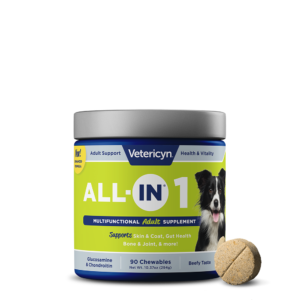Updated March 19, 2024
One of the hardest experiences for just about any pet owner is when their pup is clearly in distress or discomfort. The problem lies in the fact that it’s obvious that something’s the matter, but your dog can’t communicate exactly what they’re feeling. Instead, you have to be attentive to their actions and changes in behavioral patterns in order to piece together the clues and figure out what’s wrong—that is, in most cases.
When it comes to dog indigestion or gastric issues, the unpleasant symptoms are often all too apparent. And, while all canine breeds are susceptible to stomach problems from time to time, there are clinical signs that you should be on the lookout for that indicate a more serious gastric issue.
Below, we’ll cover everything you need to know as a pet owner about dog indigestion, including what causes it, signs and symptoms, prevention methods, and how you can provide relief.
What is Dog Indigestion?
Because your dog’s diet is relatively unvaried, it’s easy to forget that they, like humans, are susceptible to gastric distress. Most people incorrectly assume that dogs have a much tougher and robust digestive system. After all, the canine is not so far removed from its wolf predecessors,1 and any dog owner knows that pups will eat just about anything they can get their paws on.
However, dogs don’t quite have the tummies of steel we often assume they do. Amongst other factors, domestication and years of selective genetic breeding have gradually sensitized the average dog’s stomach.
All that said, the average case of canine indigestion is simply gastric distress that comes from eating the wrong food, too much food, or too much of a certain type of food.
For instance, your pup may eat the wrong food if they have a food allergy—dogs can have dairy or egg allergies just like humans, and might even be allergic to beef or chicken.2 Alternatively, your dog may have overestimated their own digestive abilities and eaten something inedible (e.g. a household item, like a sponge) or something toxic to dogs (e.g. grapes).
Another potential reason for dog indigestion is that your dog is getting used to a new type of food, or their food’s fiber content might not be high enough (adult dogs’ diets should be 2.5%-4.5% fiber).3
If all else is ruled out, stress (from a change in the household, like a child moving out or the introduction of a new pet) or an underlying illness or infection may be the culprit.
Regardless of the cause, when your dog is suffering from indigestion, you might notice them battling symptoms similar to the ones you would. These include:
- Nausea
- Heartburn
- Acid reflux
If your dog appears to be in any kind of gastrointestinal distress, it’s best to consult a vet to get to the bottom of the issue and help your pet find relief.

Why Does Dog Indigestion Occur?
Typically, standard dog indigestion comes down to three key gastric issues:
- Excessive stomach acid buildup — When the body is working properly, this potent substance is used by both human and canine stomachs to break down food into nutrients and wastes as well as aid the digestive process. However, indigestion occurs when your pup’s stomach begins to produce too much stomach acid.
In such cases, pressure builds up within the gastric system, which causes stomach pain, discomfort, and bloating, and can even irritate the esophagus and cause gastric reflux.4 In response, a dog’s body naturally attempts to alleviate the problem by releasing the pressure however possible; and the only way that pressure can go is through your pup’s orifices, i.e. the mouth and anus.
- Inflammation of the stomach – This can cause muscle contractions, which lead to vomiting.5 After a few days of withholding and then gradually re-introducing food (and potentially using prescription anti-vomiting medication), your pup should recover naturally.
- Inflammation of the intestine – Similarly, this causes muscle contractions within the intestines which speed the contents of your stomach through the tract, leaving it too little time for the fluids to be properly absorbed back into the intestines. This is what causes diarrhea (similar to IBS in humans).6
You’ll likely be able to determine which issue is the one at hand based on the symptoms you see in your dog. From there, a vet can help you confirm the root cause and best course of action.
How Age Can Impact Indigestion in Dogs
Interestingly, studies show7 that as dogs age their stomachs become more sensitive when it comes to digesting certain nutrients.
Depending on your dog’s track record, it might be necessary to invest in a senior dog food, or at least a softer food containing more moisture (senior dogs may have a harder time digesting dry food, especially since they lose teeth and have more difficultly chewing and breaking down food). It’s also best to cut back on table scraps and introduce a more bland, easy-to-digest diet.
Additionally, senior dogs are at a higher risk of developing other medical conditions that can cause gastrointestinal distress (i.e. kidney disease, which can lead to gastrointestinal symptoms).8 For this reason, it’s important to reach out to your vet if your dog is consistently experiencing indigestion.

Signs and Symptoms of Dog Indigestion
As you might imagine, stomach issues are a common issue every dog owner runs into. According to Nationwide pet health insurance,9 diarrhea/intestinal upset and vomiting/upset stomach were cited as the 5th and 6th most common reasons for trips to the veterinarian.
With everyday gastric problems come several noticeable dog indigestion symptoms. These include:
- Weight loss – When your dog’s stomach hurts, especially if the problem persists, it will have an impact on their diet. At first, your dog may have trouble with the act of eating itself, regularly choking or hacking as they try to get the food down. If the matter continues, your dog may stop eating as much or lose interest in food altogether. Over time, this will result in noticeable weight loss.
- Lip smacking and gulping – Repeated lip smacking and gulping are noticeable signs that your dog will likely soon vomit.10
- Stomach bloat – If you see that your pup’s stomach has been visibly distended, likely by gas buildup, this is a sign that something’s wrong. Bloating is much more serious for dogs than humans—it could be a sign that your pup’s stomach has twisted over itself, starving the pancreas of oxygen and releasing toxic hormones.11 If your pet is noticeably bloated, take them to the vet immediately.
- Vomiting/diarrhea – The most obvious and unpleasant sign that your dog’s stomach is in distress is the body violently attempting to rid itself of the offending substances.
- Bad breath – Vomiting, choking back bile, and excess stomach acid will leave your dog’s breath smelling less than pleasant. Although it may not generally smell like roses, the odor is especially pungent and acidic.
- Change in behavior – If your pup is normally energetic but begins to act differently, especially if their behavior is characterized by lethargy, they’re likely dealing with both discomfort and low energy levels due to weakness caused by improper digestion.
- Eating grass – A common phenomenon is that when a dog’s stomach is upset, they’ll eat grass as a form of natural emetic or osmotic. In 2014, a study from Proceedings of the National Academy of Science12 found that dogs self-medicate by eating grass, hoping that the source of the problem will be dragged out with their vomit or feces.
- Passing gas – Flatulence is a normal doggy pastime, and some breeds are far gassier than others. That said, excess flatulence may indicate that your dog’s sensitive stomach is trying to relieve itself of pressure.
Keep an eye out for any of these red flags, all of which may be worth a call to the vet.
Preventing Dog Indigestion
The best thing you can do to prevent indigestion in your dog is to ensure that they only eat the recommended portion of their dog food each day.13
Table scraps—especially foods that are high in fat, low in fiber, or even toxic for dogs—are a major cause of indigestion for pups. The same goes for those random culinary adventures your dog might try to take—like eating a plant on their daily walk or chewing on children’s toys.
Once you’ve found a dog food that agrees with your pup, stick with it and be sure not to overestimate or underestimate portions. While dog treats are perfectly fine in most cases, it’s also important to consider giving these in moderation, too.
Additionally, be sure your dog always has plenty of water available to keep them hydrated and promote smooth digestion. Finally, be on the lookout for factors like stress or potential allergies and mitigate them as best you can.
What Can You Do to Help a Dog with Indigestion?
If you have a dog with an upset stomach, there are several home remedies you can try for treating canine indigestion. These include:
- Wait it out – Oftentimes a bout of indigestion may be a singular thing resulting from something bad your dog ate. Sometimes, the best answer is to let nature do its work and see if they can pass the problem on their own. In such cases, avoid feeding your pet for 12 to 24 hours so that you are not compounding the problem. If symptoms persist past 48 hours, however, it’s time to bring your pup to the vet.14
- Ice – Although you may be tempted to give your dog a lot of water after they’ve been throwing up or having diarrhea, avoid doing so. Hydration is important, but it’s possible that your dog drinks too much water and only makes matters worse. Instead, give them a bowl of ice chips to chew on once every few hours. If the pup can keep those down, you can move on to water.
- Canned pumpkin – Per Pet MD, plain canned pumpkin (not spiced pumpkin pie mix) is a great holistic home remedy for pet indigestion. It’s digested slowly and gently, which can help ease the dog’s upset stomach. Smaller pups can have half a teaspoon, and large dogs a full tablespoon.
- Diet change – If the digestive problems are the result of gastric acid buildup, you may want to change your dog’s diet. A change in diet is usually an effective way to improve digestion in a dog’s body. Withhold food for a day or two, and then feed them small and regular meals of low-fat, low-protein foods since fats and proteins are often the cause of an increase in gastric acid.
- Bone broth – One of the best ways to soothe the stomach and hydrate your pup involves feeding them a bone broth soup. This can take up to 24 hours to make, but once you’ve done it, you can freeze it and then break it out whenever a stomach issue crops up. For a recipe, check out the one provided by Brindleberry Acres.
Beyond Home Remedies: Treating Your Dog’s Indigestion
Although all these can be signs of everyday indigestion in dogs, they can also point to more serious medical conditions. If your dog’s digestive problems are worsening or not subsiding, they may be suffering from something more than just regular digestive issues.
Digestive upset is normal for dogs and cats, but when your dog’s health begins to decline, that’s when you have to go see a vet for further examination. You may not want to, but it’s worth it to peruse your dog’s excretions to confirm that there’s no blood in the vomit or fecal matter.
In such cases, or should the problem persist, it’s crucial that you take your dog to the veterinarian for further testing in order to determine whether or not there are serious underlying health concerns. Your vet can also prescribe medication to ease symptoms in the meantime.
Keep Your Pup Happy and Healthy with ALL-IN
Keeping the spring in your pup’s step is a top priority for anypet parent. By understanding what might cause dog indigestion, you can help ensure your pup stays happy and tummy-trouble-free. And, if you’re looking to offer your pet a holistic wellness boost, you can add Vetericyn’s ALL-IN supplement to their diet.
ALL-IN dog supplement works just like a daily vitamin for your dog. It comes in puppy, adult, and senior formulas, all packed with ingredients that can promote overall wellness. Featuring collagen, stomach-healthy probiotics, ashwagandha, and more, ALL-IN is designed to give your pup a natural boost in just about every physical and mental category.
Treating your pup to ALL-IN is a gift for both them and you. You’ll notice their outer glow, and have peace of mind knowing that they’re glowing on the inside, too.
 Reviewed by C. Scott Van Winkle
Reviewed by C. Scott Van Winkle
Scott has been with Innovacyn for the past 11 years and has been working within the Burlingame portfolio of companies for the past 23 years. Scott brings a diverse background to Innovacyn. With an upbringing as the 5th generation on his families cattle ranch, Scott has a passion for animal health and the continuous improvement surrounding agricultural practices. Scott earned marketing and business management degrees from the University of Idaho and holds an Executive MBA from Pepperdine University.
Sources:
- PBS. Evolution of the Dog. https://www.pbs.org/wgbh/evolution/library/01/5/l_015_02.html
- Union Animal Hospital. Most Common Digestive Issues in Dogs and How to Relieve Them. https://unionpetvet.com/articles/general/624556-most-common-digestive-issues-in-dogs-and-how-to-relieve-them
- South Grand Lake Veterinary Clinic. Fitting Fiber into Fido’s Food Bowl. https://www.southgrandlakevetclinic.com/articles/general/418450-fitting-fiber-into-fido-s-food-bowl
- VCA Animal Hospitals. Gastroesophageal Reflux Disease (GERD) in Non-Brachycephalic Dogs. https://vcahospitals.com/know-your-pet/gastroesophageal-reflux-disease-gerd-in-nonbrachycephalic-dogs
- VCA Animal Hospitals. Gastritis in Dogs. https://vcahospitals.com/know-your-pet/gastritis-in-dogs
- Merck Veterinary Manual. Inflammatory Bowel Disease. https://www.merckvetmanual.com/dog-owners/digestive-disorders-of-dogs/disorders-of-the-stomach-and-intestines-in-dogs
- National Library of Medicine. Age-related digestibility of nutrients depending on the moisture content in aged dogs. https://www.ncbi.nlm.nih.gov/pmc/articles/PMC8672265/
- VCA Animal Hospitals. Chronic Kidney Disease in Dogs. https://vcahospitals.com/know-your-pet/kidney-failure-chronic-in-dogs
- Nationwide Pet Insurance. Common medical conditions for dogs and cats can lead to costly veterinary visits. https://news.nationwide.com/common-medical-conditions-for-dogs-and-cats-can-lead-t-costly-veterinary-visits/
- VCA Animal Hospitals. Vomiting in Dogs. https://vcahospitals.com/know-your-pet/vomiting-in-dogs
- American Kennel Club. Bloat (or GDV) in Dogs: What is It and How Is It Treated? https://www.akc.org/expert-advice/health/bloat-in-dogs/
- National Library of Medicine. News Feature: Animals that self-medicate. https://www.ncbi.nlm.nih.gov/pmc/articles/PMC4267359/?_ga=2.74404626.1410953510.1708963949-1799325991.1708543933
- Pet MD. Upset Stomach in Dogs. https://www.petmd.com/dog/wellness/evr_dg_remedies-for-upset-stomach-in-dogs
- Texas A&M University, Veterinary Medicine & Biomedical Sciences. When to See a Veterinarian for a Dog’s Stomach Ache. https://vetmed.tamu.edu/news/pet-talk/dogs-stomach-ache/

